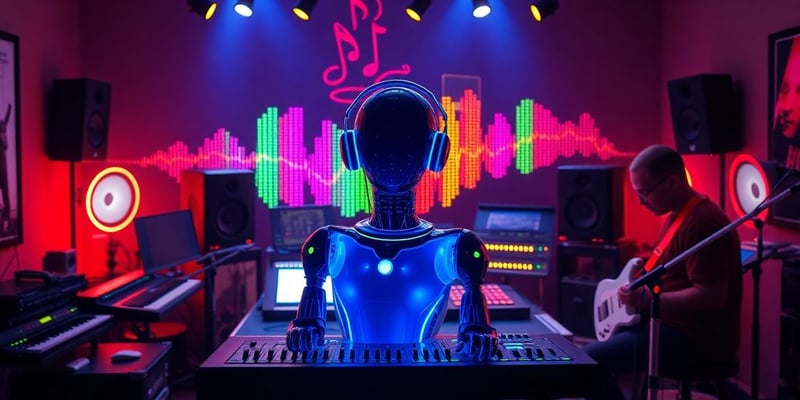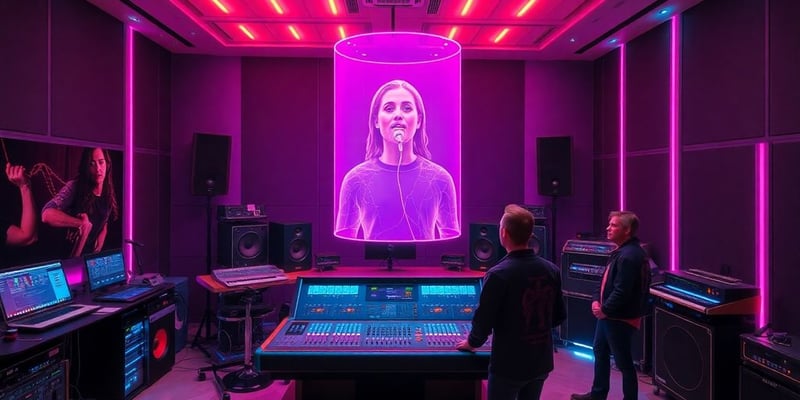
Unlock Your Creativity with AI Vocalist: The Future of Music Production in 2025
Save 15%

Imagine a world where your favorite songs are sung by voices that aren't human, yet sound just as good, if not better. That's the magic of AI vocalists, changing the way we think about music production in 2025. This tech isn't just a passing trend; it's reshaping the music industry, making it more creative and accessible. Whether you're a solo artist or part of a big production team, AI vocalists are tools that can help bring your musical ideas to life in ways you never thought possible.
Key Takeaways
- AI vocalists are revolutionizing the music scene by offering new creative possibilities.
- These vocalists help in reducing production costs while maintaining quality.
- AI technology is influencing various music genres, creating fresh sounds.
- Ethical issues like copyright and authenticity are still being debated.
- Live performances are being transformed with the integration of AI vocals.
The Rise of AI Vocalists in Modern Music
Understanding AI Vocal Technology
AI vocal technology isn't just a new gadget—it's changing how we think about music. These systems can mimic human voices, creating sounds that are almost indistinguishable from real singers. They use algorithms to learn and replicate vocal patterns, making them quite versatile. What's wild is how these AI vocalists can sing in different languages and styles, adapting to whatever the music demands. It's like having a multilingual, multi-genre singer available at the click of a button.
How AI is Transforming Vocal Performances
AI is really shaking things up in the music world. Traditional vocal performances are getting a tech makeover. With AI, producers can tweak and perfect vocals in ways that weren't possible before. Imagine a singer hitting every note perfectly, every single time. That's what AI brings to the table. Plus, AI can experiment with vocal effects that human singers might struggle with, adding layers and depth to performances.
- Seamless pitch correction
- Infinite vocal range possibilities
- Unique vocal effects and harmonies
The Role of AI in Music Innovation
AI isn't just a tool—it's a partner in creativity. Musicians and producers are using AI to push boundaries and explore new musical landscapes. It's like having a collaborator who's always ready to try something new. AI's expected role is to unite artists on shared technological platforms, fostering cross-pollination that could lead to the emergence of new genres and innovative musical hybrids.
AI vocalists are not just about replacing human voices; they're about expanding the horizons of what's possible in music. They offer a new palette of sounds and possibilities, helping artists to dream bigger and bolder.
How AI Vocalists are Shaping the Future of Music Production
AI-Driven Creativity in Songwriting
AI vocalists are changing how we think about songwriting. Imagine having a virtual partner who can suggest lyrics, melodies, and harmonies on the fly. This technology is not just a tool; it's like having another creative mind in the room. AI can analyze trends and suggest ideas that fit current musical tastes, helping artists stay relevant. Some platforms even allow you to input a theme or emotion, and the AI generates a song draft based on that input. It's like having a co-writer who's always available.
Enhancing Music Production with AI Vocals
AI vocals bring a new layer to music production. Producers can experiment with different vocal styles without needing a human singer for each version. This flexibility allows for more creative freedom and experimentation. For instance, you can try out a pop vibe, then switch to something more classical—all within the same session. AI vocals can also be fine-tuned to match the emotional tone of the music, making it easier to create a cohesive sound.
The Impact of AI on Music Genres
AI is also mixing up music genres in unexpected ways. By analyzing vast amounts of data, AI can blend elements from rock, jazz, hip-hop, and more, creating unique sounds that might not have been imagined otherwise. This genre-blending is opening up new avenues for artists to explore and is leading to the creation of fresh, innovative music styles. The possibilities are endless, and it’s exciting to think about what might come next.
AI vocalists are not just a passing fad. They're here to stay, and they’re making waves in the music industry. Whether you're an artist looking to innovate or a producer seeking efficiency, AI offers something for everyone. The future of music production is looking bright, with AI vocalists leading the charge.
Exploring the Benefits of AI Vocalists for Artists and Producers

Cost-Effective Music Production Solutions
In the world of music production, budgets can get tight. AI vocalists offer a cost-effective solution by reducing the need for expensive studio time and session singers. With AI, producers can experiment with different vocal styles without breaking the bank. This tech allows for rapid iteration and testing of ideas, which is a huge plus for indie artists working on a shoestring budget.
Expanding Creative Possibilities with AI
AI vocalists open up a world of creative possibilities. Artists can explore new genres and styles without being limited by their own vocal range or ability. Imagine a rock band wanting to add some operatic flair to their tracks or a pop artist infusing some jazz vocals into their latest hit. AI makes it possible to blend these elements seamlessly, inspiring artists to push their creative boundaries. AI-generated music is set to revolutionize the industry by inspiring artists and composers, helping them overcome creative blocks.
AI Vocalists as Collaborative Tools
Collaboration is key in music, and AI vocalists are becoming valuable partners in the creative process. They can work alongside human artists, providing harmonies or backing vocals that might be challenging to achieve otherwise. This collaboration isn't about replacing human talent but enhancing it. AI can suggest new ideas or directions for a song, acting like a creative partner who never tires or runs out of inspiration.
AI vocalists are not just about cutting costs or saving time. They're about expanding horizons and exploring new musical landscapes that were previously out of reach. As technology continues to evolve, the potential for AI in music production will only grow, offering artists and producers exciting new tools to express their creativity.
Challenges and Ethical Considerations in AI-Driven Music
Addressing Copyright and Ownership Issues
With the rise of AI-generated music, copyright and ownership have become hot topics. Who owns a song created by an algorithm? Is it the programmer, the user, or the AI itself? These questions are tricky and the music industry is still figuring them out. Copyright laws were not made with AI in mind, so there's a lot of gray area. Some people worry that AI might even "borrow" from existing songs without permission, leading to legal battles.
- Determining legal ownership of AI-generated content
- Protecting original creators' rights
- Navigating international copyright laws
Ensuring Authenticity in AI-Generated Vocals
Authenticity is a big deal in music. Fans want to feel a connection with the artist, but when that artist is an AI, things get complicated. Can a machine truly express emotions or tell a story? Some say yes, while others are skeptical. AI can mimic vocal styles and even create new ones, but the lack of human touch can be a turn-off for some listeners.
AI-generated vocals might sound perfect, but they can sometimes miss the raw emotion that comes from a human artist pouring their heart into a performance.
Balancing Human and AI Contributions
Finding the right balance between human creativity and AI assistance is crucial. Musicians and producers are learning to work alongside AI, but it's not always smooth sailing. There's a fear that AI might overshadow human talent, leading to a loss of jobs in the industry. However, many see AI as a tool that can help artists push the boundaries of what's possible in music.
- Collaborating effectively with AI
- Maintaining human creativity in music
- Addressing industry concerns about job displacement
For more insights on the ethical and copyright implications of AI-generated music, it's important to consider how these debates might affect consumer trust and the overall landscape of music creation.
The Technology Behind AI Vocalists

Machine Learning in Vocal Synthesis
Machine learning is the backbone of AI vocalists. It allows computers to mimic human voices by analyzing tons of data. These systems learn from countless hours of recorded speech and singing, figuring out patterns and nuances that make each voice unique. With this technology, AI can generate vocals that sound strikingly human. It's not just about hitting the right notes; it's about capturing emotion and style.
The Role of Neural Networks in AI Vocals
Neural networks are like the brain of AI vocalists. They process information in layers, each one refining the output a bit more. This tech enables AI to adapt and improve over time, getting better at replicating human vocal characteristics. The networks can handle complex tasks like pitch modulation and dynamic expression, making AI vocals more realistic and engaging.
Advancements in AI Audio Processing
AI audio processing has come a long way. Today, AI can streamline music production by aligning vocals, tuning recorded takes, and even recreating the sound of famous singers. This evolution allows musicians and producers to experiment with new sounds and techniques without the limitations of traditional vocal recording. AI audio tools are constantly being updated, offering more precision and creativity in the studio.
AI vocalists are not just a futuristic concept; they're transforming how we create and experience music today. This technology opens up endless possibilities for artists and producers, pushing the boundaries of traditional music production.
AI Vocalists and the Evolution of Live Performances
Integrating AI Vocals in Concerts
Integrating AI vocals into live performances is shaking things up in the music scene. Concerts are no longer just about the band on stage; they're becoming high-tech experiences. AI vocalists can perform alongside human singers, creating a unique blend of digital and human sounds. This fusion opens up new creative possibilities for artists, allowing them to experiment with sounds that were once impossible to produce live. Some artists are even using AI to "sing" parts of their songs during concerts, adding a futuristic flair to their shows.
Enhancing Audience Experience with AI
AI is not just about the sounds; it's about the entire concert experience. With AI, concerts can become more interactive. Imagine a show where the music adapts to the audience's mood or where AI-generated visuals respond to the beat of the music. This level of interactivity can make concerts more engaging and memorable. Plus, AI can help create personalized experiences for fans, making each concert feel unique.
The Future of Live Music with AI Vocalists
Looking ahead, AI vocalists are likely to become a staple in live music. They offer artists the chance to push boundaries and try out new things. However, this also raises questions about the impact on human singers, as AI-generated vocals could potentially reduce opportunities for them in commercial settings. As technology continues to advance, the music industry will need to find a balance between embracing AI and supporting human talent. But one thing's for sure: AI vocalists are here to stay, and they're set to redefine what we think of as a "live" performance.
As AI continues to weave its way into the fabric of live music, concerts might just become the ultimate blend of art and technology. The stage is set for a new era of performances that could change the way we experience music forever.
The Global Impact of AI Vocalists on the Music Industry
AI Vocalists in Different Cultural Contexts
AI vocalists are making waves across the globe, and it's fascinating to see how different cultures are embracing this technology. In Japan, for example, virtual idols like Hatsune Miku have been popular for years, and AI vocalists are a natural evolution of that trend. Meanwhile, in Western countries, AI singers are being used to revive the voices of legendary artists, giving fans a chance to hear "new" music from their favorites. This blending of technology and culture is creating a unique musical landscape that's never been seen before.
Economic Implications for the Music Industry
Let's talk money. AI vocalists are changing the economics of music production. With AI, the cost of producing a song can drop significantly because you don't need to pay a human singer. This means more people can afford to create music, which could lead to a surge in new artists and fresh sounds. On the flip side, it might also mean fewer jobs for traditional vocalists. It's a double-edged sword, and the industry will need to adapt.
AI's Role in Global Music Trends
AI is not just changing how music is made; it's also influencing what kind of music becomes popular. Algorithms can analyze trends and predict what listeners want to hear, potentially shaping the global music scene. This could lead to a more homogenized sound worldwide, or it could help niche genres find their audience. It's a bit of a wild card, but one thing's for sure: AI is here to stay in the music world.
As AI continues to weave its way into the fabric of music, we're seeing a shift not just in how songs are produced, but in who gets to create them. With AI vocalists, the barriers to entry are lower than ever, allowing a more diverse range of voices to be heard. It's an exciting time for music lovers and creators alike.
Wrapping It Up
So, here we are, looking at a future where AI vocalists might just be the next big thing in music. It's kind of wild to think about how far we've come, right? From the days of vinyl records to now having virtual singers that can belt out tunes just like your favorite artist. Sure, there are some bumps in the road, like figuring out how to keep the human touch in music, but that's part of the journey. As we move towards 2025, it's clear that AI is going to play a big role in how music is made and enjoyed. Whether you're a musician or just someone who loves a good beat, it's an exciting time to be part of the music world. Who knows what amazing sounds we'll be jamming to in the next few years?
Frequently Asked Questions
What are AI vocalists?
AI vocalists are computer programs that can sing and perform songs like human singers. They use technology to create realistic singing voices.
How do AI vocalists change music production?
AI vocalists make it easier and cheaper to produce music. They help songwriters come up with new ideas and allow producers to create songs without needing a human singer.
Can AI vocalists perform live?
Yes, AI vocalists can be used in live concerts. They can sing along with human performers or even perform on their own with the help of special technology.
Are there any problems with using AI vocalists?
Some challenges include copyright issues and making sure the music still feels real and authentic. People are also concerned about how much control humans have over the music.
Do AI vocalists work in all music styles?
AI vocalists can be used in many different types of music. They are versatile and can adapt to various musical genres, from pop to classical.
How do AI vocalists affect jobs in the music industry?
AI vocalists could change some jobs in music, like reducing the need for backup singers. However, they also create new opportunities for tech-savvy musicians and producers.









